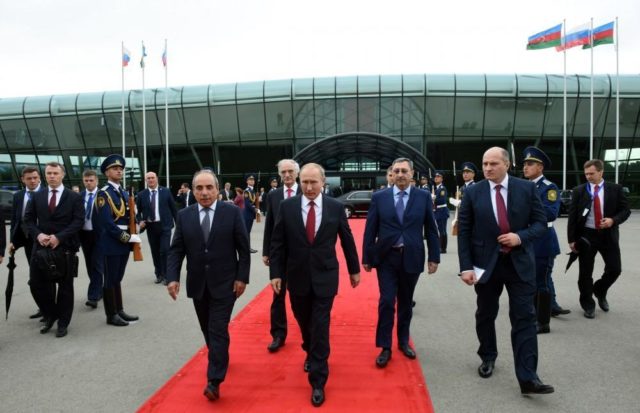
Could Vladimir Putin’s Visit to Azerbaijan Shift the Regional Balance of Power?
Publication: Eurasia Daily Monitor Volume: 15 Issue: 144
By:

Russian President Vladimir Putin paid a surprise official visit to Azerbaijan, on September 27. The formal reason for his arrival was to hold talks with Azerbaijani President Ilham Aliyev as well as to jointly attend the Ninth Interregional Russia-Azerbaijan Forum (Kremlin.ru, September 27; AzerNews, September 28). Local mass media in both Azerbaijan and Russia described Putin’s visit as a next significant step in improving the strategic partnership between the two countries (AzerNews, September 26).
Prior to sitting down together in Baku, the last time the two leaders spoke face-to-face was in Sochi, Russia, on September 1 (AzerNews, September 1). During that meeting, Putin and Aliyev signed several documents encompassing the economy, agriculture, tourism, and the defense sector. The most significant outcome of their talks was indeed a new $5 billion arms deal to purchase Russian-made weaponry. Moreover, President Aliyev stated that the number of bilateral military agreements will increase in the near future (Izvestia, September 3).
Such a positive statement regarding military deals with Russia from the president of Azerbaijan inevitably brings to the fore the recent debate over Baku’s membership in the Moscow-led Collective Security Treaty Organization (CSTO). The idea that Azerbaijan should, in fact, consider joining the military bloc was recently put forward by Azerbaijani member of parliament Ali Huseynli, who suggested that among the benefits of CSTO membership would be the ability to purchase Russian-made weaponry at internal (domestic Russian), not international, market prices (see EDM, September 10). Nevertheless, perhaps not coincidentally, Putin’s September 27 visit to Baku overlapped with another significant international event held in the Azerbaijani capital—the third annual defense exhibition ADEX 2018 (see EDM, October 10). This year, the event gathered more than 200 defense-sector companies from 32 countries, including—in addition to Russia and Azerbaijan—Turkey, Israel, Belarus, Serbia, Ukraine, Pakistan Italy, Lithuania, China, the Netherlands and France (Turan.az, September 24).
In fact, Moscow has increasingly been pushing for a closer military partnership with Baku. Over the past year, in light of the deepening political shifts occurring in Armenia, Russia has started to consider Azerbaijan its most reliable partner in the South Caucasus (see EDM, September 18). That said, some Russian experts do not hide their frustration over this country’s growing defense partnership with Israel, especially amidst the escalating Russian-Israeli diplomatic tensions in the aftermath of the downing of a Russian surveillance plane in Syria (see EDM, September 27). For instance, just prior to Putin’s visit to Baku, Israel’s Defense Minister Avigdor Lieberman traveled to Azerbaijan for five days—the longest official visit to Azerbaijan by an Israeli official to date. Reportedly, the main topic of discussion on Lieberman’s agenda was strengthening bilateral defense cooperation. According to the Stockholm International Peace Research Institute (SIPRI), Israel was Azerbaijan’s largest arms supplier for the last two years, selling the country $385 million worth of weaponry (Jerusalem Post, September 13). Azerbaijani authorities may also be looking to acquire a new Israeli-made missile defense system (see EDM, June 19), but this has not been fully confirmed as of yet.
In light of this, Moscow is eager to win back more of the Azerbaijani arms market, even though Israeli-made weaponry is more modern and technologically advanced compared to much of what Russia sells abroad. However, Russia continues to wield significantly greater political-military influence in the South Caucasus, with regional security highly affected by Moscow’s actions. Baku understands this reality and thus has sought to play a balanced foreign policy toward these two powers and expresses a willingness to simultaneously purchase weapons from both.
At the same time, it should be noted that the South Caucasus region is still plagued with so-called “frozen conflicts,” in particular an unresolved low-level war over Karabakh between Azerbaijan and Armenia. Russia, however, pretends to be an effective peace mediator in this conflict resolution process. Undoubtedly, this issue was also discussed during Putin’s Baku visit, which had been arranged just one day before the summit of Commonwealth Independent States (CIS) in Dushanbe kicked off. Reportedly, the Dushanbe CIS summit was held under a positive atmosphere. And Azerbaijani President Ilham Aliyev and Armenian Prime Minister Nikol Pashinyan, who both attended, spoke face-to-face for the first time there. In the Tajikistani capital, the two leaders agreed on several steps to reduce tension between the Armenian and Azerbaijani armed forces (EurasiaNet, October 1). It thus appears that the Azerbaijani president was assured of Russia’s amenable position toward his country during Putin’s recent visit to Baku; in contrast, relations between Moscow and Yerevan look rather strained (see EDM, October 11). Indeed, the close political dialogue between Russia and Azerbaijan has already become a source of concern for some Armenian experts.
Moscow strives to bring Baku closer to its CSTO orbit by emphasizing cheaper arms sales and the possibility of “liberating five districts” that are still under Armenian occupation. Nevertheless, Azerbaijan still has not made any significant step toward the Russian-led military bloc. Moreover, Aliyev remains reluctant to resume peace negotiations with Pashinyan without additional guarantees as well as due to Yerevan’s stated desire to invite the separatist Karabakh government into the peace negotiations. Thus, for now, the status quo is unlikely to be broken.



